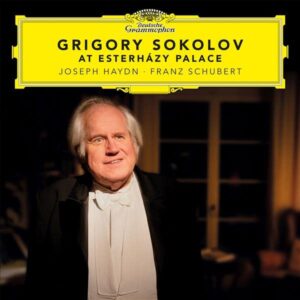Ordinarily a piano recital containing three minor-key Haydn sonatas on the first half followed by Schubert’s Impromptus D. 935 on the second half would never provoke a box office stampede. Then again, a cult figure like Grigory Sokolov could play the C major scale and sell out Carnegie Hall. His control of the instrument and powers of projection remain impressively intact, while the self-aware and self-absorbed qualities of his musicianship increase over time. Indeed, Sokolov’s playing throughout this 2018 Haydn/Schubert program from the Esterházy Palace proves to be just as opulent, ornate, and well-proportioned as the fabled venue itself.
In certain respects, Sokolov’s Haydn reminds me of Arturo Benedetti Michelangeli’s Beethoven, where every phrase, every balance, every dynamic gradation is painstakingly pondered and processed. Beautiful melodic shaping takes precedence over contrapuntal interplay, over surprises in drama and harmonic motion. For example, in the B minor Sonata No. 47 Sokolov sets the Rondo Finale’s wheels in animated motion, yet never conveys the variety of phrasing and urgency of accentuation that characterizes Jean-Efflam Bavouzet’s comparably paced reading.
Indeed, Sokolov tends to interpret each Haydn sonata on the same level. Two minutes into Sokolov’s awesomely refined, cannily calibrated C-sharp minor sonata first movement, you’ll know what to expect going forward. By contrast, Ekaterina Derzhavina’s quicker tempo and more volatile dynamics keep the listener guessing.
Years ago I wrote a review declaring a pianist’s Schubert D. 935 to be “the least ‘impromptu’-sounding” Schubert Impromptus on the market. That distinction now falls to Sokolov. He exaggerates the opening F minor selection’s rhetorical gestures, while his A-flat Impromptu similarly buckles under the weight of caesuras, tenutos, and breath marks. The B-flat Theme and Variations Impromptu is superficially pretty, yet internally anemic.
As for the normally urgent and vivacious F minor Impromptu No. 4, Sokolov’s slow-motion, tediously underpowered interpretation beggars belief. Nevertheless, the audience applauds wildly, and Sokolov obliges with encores: a dulcet Rameau Le Rappel des oiseaux, a charming waltz by Griboyedov, a Schubert Hungarian Melody lacking paprika, and a freeze-framed, chromium-plated Debussy Des pas sur la neige. Sokolov also inflates Chopin’s D-flat Prelude Op. 28 No. 15 to ponderous proportions; the persistent repeated A-flats morph from plump raindrops into sticky oobleck. Note that my review concerns the audio CDs only, and not the Blu-Ray video component. In the meantime, I look forward to Sokolov’s C major scale.
































